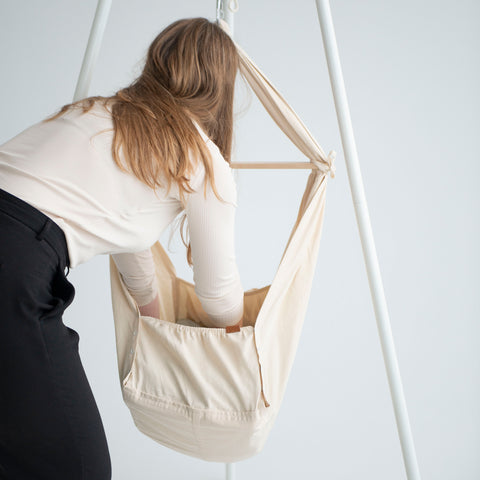
Magic cuddling trick - by Sleep Nurse, Sine Ditlev Bihlet
Do you find that your child always wakes up after 20-30-45 minutes? So read along here.
At 2-4 months of age, many babies experience a change in sleep. The child develops a lot during this period. Sleep therefore recedes – in English it is called sleep regression – here the child begins to sleep in sleep cycles of 30-45 minutes.
Before they slept in waves of sleep; non-REM followed by REM sleep. But now there is an awakening, at every sleep cycle.
This awakening can be difficult for some children to move on from because they have not been used to sleeping this way before.
At this age, the child also begins to orient himself towards the world. So when the child wakes up after 30 minutes, and hears or sees something exciting, they cannot find their way back – even if they are tired.
At 5-6 months of age it usually gets better. For some, however, it continues. It can affect the well-being of the whole family. Because you are always on. Here it is important to look at what can be done so that everyone thrives in the best possible way.
A few magical tricks
Constant rocking motion:Some children sleep better with a constant rocking motion. It can be a sling cradle with a motor, jumping on a ball, or walking and rocking the pram constantly.
You can also try:
Rocking movement until the child sleeps, then rocking again before waking up:
If you put your child to sleep in the swing cradle, switch off the engine when the child is asleep. For example, if you have the child in your arms, stop the rocking movement when he is asleep and place the child in the cradle. Let the child sleep - without rocking motion - and set a clock for 20-25 minutes (depending on when the child usually wakes up), and when the clock rings, switch on the engine.
Because then it happens that the rocking movement starts in deep sleep. When a rocking movement occurs during deep sleep, there is some research that suggests that the sleep that follows (i.e. dream sleep) can become deeper. Also the awakening and light sleep after, we can go deeper, by establishing and initiating a rocking movement in DEEP sleep - instead of it having been constant from the start.
This can help for some where the children wake up after short naps. It's not guaranteed to work the first time. When it comes to sleep, things rarely work the first time. Repetitions are needed to see if it works. Try at least for 1 week. Do not necessarily do it for every nap, but start with, for example, 1 nap (preferably one of the first naps) and see after 1 week if it helps. Over time, you should try not to set a clock - because then the child may have learned to move on in his sleep.
Vi anstränger oss mycket för att förmedla bra och nyttig kunskap till alla nyblivna föräldrar. Nedan hittar du utvalda favoritartiklar som vi tror du kommer att gilla.
